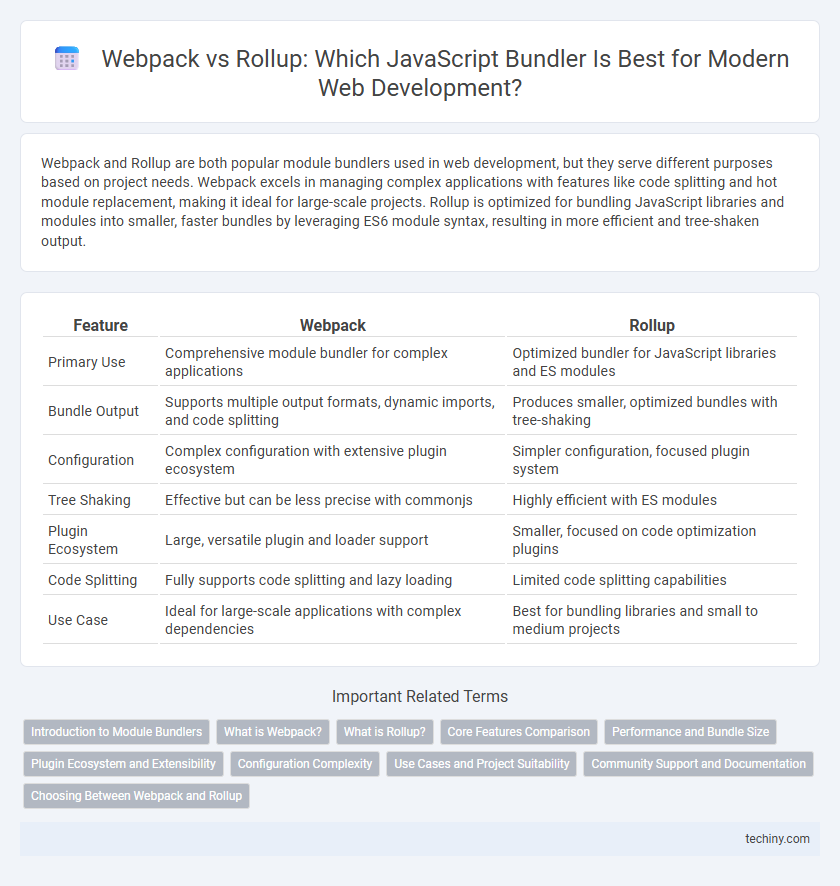Webpack and Rollup are both popular module bundlers used in web development, but they serve different purposes based on project needs. Webpack excels in managing complex applications with features like code splitting and hot module replacement, making it ideal for large-scale projects. Rollup is optimized for bundling JavaScript libraries and modules into smaller, faster bundles by leveraging ES6 module syntax, resulting in more efficient and tree-shaken output.
Table of Comparison
| Feature | Webpack | Rollup |
|---|---|---|
| Primary Use | Comprehensive module bundler for complex applications | Optimized bundler for JavaScript libraries and ES modules |
| Bundle Output | Supports multiple output formats, dynamic imports, and code splitting | Produces smaller, optimized bundles with tree-shaking |
| Configuration | Complex configuration with extensive plugin ecosystem | Simpler configuration, focused plugin system |
| Tree Shaking | Effective but can be less precise with commonjs | Highly efficient with ES modules |
| Plugin Ecosystem | Large, versatile plugin and loader support | Smaller, focused on code optimization plugins |
| Code Splitting | Fully supports code splitting and lazy loading | Limited code splitting capabilities |
| Use Case | Ideal for large-scale applications with complex dependencies | Best for bundling libraries and small to medium projects |
Introduction to Module Bundlers
Module bundlers like Webpack and Rollup play a crucial role in modern web development by efficiently packaging JavaScript files and their dependencies into a single file or smaller manageable chunks. Webpack is highly versatile, supporting complex configurations and a wide range of asset types, making it ideal for large-scale applications with dynamic module loading. Rollup excels in producing smaller, optimized bundles for libraries and applications focused on ES6 modules, leveraging tree-shaking to eliminate unused code and improve performance.
What is Webpack?
Webpack is a powerful module bundler commonly used in modern web development to compile JavaScript modules and assets into optimized bundles for efficient browser delivery. It supports code splitting, hot module replacement, and tree shaking, enhancing application performance and developer productivity. With an extensive plugin ecosystem and configuration flexibility, Webpack enables fine-grained control over the build process for complex web applications.
What is Rollup?
Rollup is a JavaScript module bundler designed to optimize ES6 modules by producing smaller, faster bundles through tree-shaking and scope hoisting techniques. It is particularly effective for libraries and applications that require highly efficient and clean code output, supporting plugins for customization. Rollup's ability to generate multiple output formats, including CommonJS, ES modules, and UMD, makes it a versatile choice for modern web development workflows.
Core Features Comparison
Webpack provides advanced module bundling with support for both JavaScript and non-JavaScript assets, enabling complex project configurations and powerful plugin ecosystems. Rollup specializes in producing smaller and faster bundles through tree-shaking and ES module optimization, ideal for library development. Both tools offer code splitting and asset management but differ in configuration complexity and output focus, with Webpack favoring comprehensive application builds and Rollup emphasizing efficient module packaging.
Performance and Bundle Size
Webpack and Rollup differ significantly in performance and bundle size, with Rollup often producing smaller, more efficient bundles due to its tree-shaking capabilities and static module analysis. Webpack provides faster incremental builds through advanced caching and supports complex dependency graphs, making it suitable for large-scale applications. Rollup excels in optimizing ES modules for production, resulting in leaner output ideal for libraries and applications where bundle size is critical.
Plugin Ecosystem and Extensibility
Webpack offers a vast plugin ecosystem with thousands of plugins supporting diverse functionalities such as code splitting, hot module replacement, and asset management, making it highly extensible for complex web applications. Rollup features a more streamlined set of plugins optimized for tree-shaking and ES module bundling, providing simpler yet efficient extensibility tailored for library and smaller project builds. Both tools support custom plugin development, but Webpack's mature ecosystem enables greater flexibility and integration options for varied development needs.
Configuration Complexity
Webpack often requires intricate configuration files due to its extensive plugin system and various loaders, which can increase setup time for complex projects. Rollup uses a simpler, more straightforward configuration with fewer plugins, making it easier to optimize for smaller libraries and applications. Developers prioritizing enhanced configurability might choose Webpack, while those seeking minimal setup and faster builds often prefer Rollup.
Use Cases and Project Suitability
Webpack excels in large-scale applications requiring complex asset management, supporting multiple entry points and dynamic module loading, making it ideal for enterprise-level projects. Rollup is best suited for library and package development with its efficient tree-shaking capabilities and smaller bundle sizes, enhancing performance for reusable modules. Projects focused on modular ES6 code and minimal build configurations benefit significantly from Rollup's simplicity and optimized output.
Community Support and Documentation
Webpack boasts a large and active community with extensive documentation, offering numerous tutorials, plugins, and real-world examples that facilitate troubleshooting and customization. Rollup's community, while smaller, is highly focused on modular JavaScript bundling and provides clear, concise documentation aimed at optimized tree shaking and ES module support. Strong community support and comprehensive documentation in both tools ensure efficient development workflows and quicker problem resolution.
Choosing Between Webpack and Rollup
Choosing between Webpack and Rollup depends on the project's complexity and optimization needs. Webpack excels in handling large, multi-entry applications with advanced features like code splitting and hot module replacement, while Rollup is ideal for bundling libraries and smaller projects due to its efficient tree-shaking and smaller output size. Evaluating factors such as plugin ecosystem, build speed, and output format compatibility helps determine the best bundler for specific development goals.
Webpack vs Rollup Infographic

 techiny.com
techiny.com